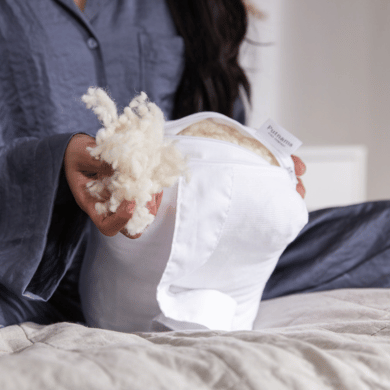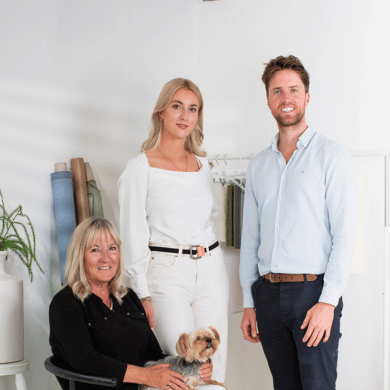
The Rise of Sleep Anxiety and What It Means for Your Health
Do you find yourself lying awake, worrying about not sleeping? It’s a frustratingly common scenario. You check the clock, calculate the dwindling hours until your alarm, and feel a wave of panic. This is sleep anxiety, a modern phenomenon where the pressure to get a perfect night’s rest becomes a source of stress itself.
This worry creates a vicious cycle.
Stress makes it harder to fall asleep, and the resulting lack of rest fuels more anxiety the next day. Over time, this pattern leads to a significant sleep debt, impacting everything from your mood to your physical health.
This guide explores the link between stress, sleep anxiety, and sleep debt. We'll break down how modern life fuels this problem and offer practical, calming strategies to help you reclaim your rest.
You'll learn how to stop worrying about sleep and start creating an environment that encourages deep, restorative rest.
What Is Sleep Anxiety?
Sleep anxiety is the stress or fear associated with the inability to fall asleep or stay asleep. It's not a formal medical diagnosis but a widely recognised experience. You might be familiar with the feeling: your mind races with thoughts like, "Why can't I sleep when I'm so stressed?" or "If I don't sleep now, I'll be useless tomorrow."
This form of sleep stress keeps your brain on high alert, releasing cortisol, the stress hormone, precisely when you need your body to wind down. Research confirms this bidirectional relationship: anxiety can disrupt sleep, and sleep deprivation can amplify anxiety. A 2013 study found that sleep loss intensifies reactions in the brain's emotional centres, particularly the amygdala, making you more prone to anxiety.
This cycle of worry and restlessness is exhausting. The more you fixate on the need to sleep, the more elusive it becomes, leading to frustrating, sleepless nights and tired days.
Understanding Sleep Debt and Why It Matters
When you consistently get less sleep than your body needs, you accumulate a sleep debt. Most adults require 7-9 hours of sleep per night to function optimally. If you need eight hours but only get six, you end a single night with two hours of sleep debt. According to research, it can take up to four days to recover from just one hour of lost sleep.
So, what is sleep debt and how to recover from it?
It’s the cumulative effect of insufficient sleep over days, weeks, or even months. Think of it like a financial debt; the longer it goes unpaid, the higher the interest.
The effects of sleep deprivation are significant and wide-ranging:
- Mental Health: Chronic sleep debt is linked to increased anxiety, depression, mood swings, and irritability. It reduces your brain's ability to regulate emotions, making it harder to cope with daily stressors.
- Cognitive Function: Lack of sleep impairs concentration, memory, and decision-making. You might find yourself making more mistakes or struggling to focus at work.
- Physical Health: Prolonged sleep debt increases the risk of serious health issues, including heart disease, hypertension, diabetes, and a weakened immune system. It can also lead to weight gain due to metabolic dysregulation.
Ignoring sleep debt doesn't make it disappear. The effects build over time, silently undermining your well-being until you feel perpetually drained and overwhelmed.
How Modern Stressors Fuel the Problem
Our lifestyles are a perfect storm for creating restless nights and anxiety. Busy work schedules, family responsibilities, and the constant digital buzz make it difficult to switch off.
- Digital Overload: The blue light from screens suppresses melatonin, the hormone that signals sleep. Endless scrolling on social media or checking work emails late at night keeps your brain engaged and alert.
- "Always-On" Culture: The pressure to be constantly productive means many of us sacrifice sleep for work. This hustle culture normalises sleep deprivation as a badge of honour, rather than a health risk.
- Irregular Routines: Shift work, late-night socialising, and inconsistent bedtimes disrupt our natural circadian rhythms, the internal body clock that regulates sleep-wake cycles.
The COVID-19 pandemic amplified these issues, giving rise to "Coronasomnia." One study found that rates of clinical insomnia more than doubled during this period, with sleep disturbances directly linked to higher levels of psychological distress.
See also - The Bedtime Paradox: Why You Can’t Sleep When You’re Overtired
Practical Tips to Break the Cycle and Calm Sleep Anxiety Naturally
Recovering from sleep debt isn't about "catching up" on weekends. It's about building consistent habits that reduce sleep stress and promote sleep recovery. Here’s how to calm sleep anxiety naturally:
1. Create a Consistent Wind-Down Routine
Professor Colin Espie of the University of Oxford emphasises being on a "wind-down curve" before bed. Dedicate 30-60 minutes to relaxing activities.
- Dim the lights and put screens away at least an hour before bed.
- Read a book, listen to calming music, or take a warm bath.
- Try journaling. Writing down your worries can signal to your brain that it's okay to let them go for the night.
2. Stick to a Sleep Schedule
Go to bed and wake up at roughly the same time every day, even on weekends. A consistent schedule helps regulate your body’s internal clock, making it easier to fall asleep and wake up naturally. This is one of the most effective ways to begin sleep recovery.
3. Optimise Your Sleep Environment
Your bedroom should be a sanctuary for rest.
- Keep it cool, dark, and quiet. Use blackout curtains or an eye mask to block light.
- Minimise noise with earplugs or a white noise machine.
- Ensure your bed is comfortable. An unsupportive pillow or an old mattress can contribute to poor sleep.
4. Be Mindful of Daytime Habits
Your actions during the day have a big impact on your sleep at night.
- Get sunlight exposure in the morning to help set your circadian rhythm.
- Engage in regular physical activity, but avoid intense exercise too close to bedtime.
- Limit caffeine and alcohol, especially in the afternoon and evening. While alcohol might make you feel drowsy, it disrupts sleep quality later in the night.
5. Don’t Panic If You Can’t Sleep
If you find yourself lying awake for more than 20 minutes, get out of bed. Go to another room and do something relaxing until you feel sleepy. Lying in bed, stressing about not sleeping, will only reinforce the anxiety.
Remember, you can't force sleep.
Products That Support Calmer, Consistent Sleep
Creating a comfortable environment is crucial for reducing sleep anxiety. The right support can make a significant difference in how your body rests and recovers.
- Putnams Pillows: An ergonomic pillow that provides proper neck and spine alignment can alleviate physical discomfort that contributes to restlessness. Choosing a pillow suited to your sleeping position ensures your body can fully relax.
- Bed Wedges: For those who suffer from acid reflux, snoring, or respiratory issues, a supportive bed wedge can elevate the upper body, opening airways and reducing discomfort that often disrupts sleep.
- Natural Bedding: Materials that are breathable and regulate temperature help create a comfortable sleep climate. Putnams’ range of natural bedding helps prevent overheating, a common cause of nighttime waking.
FAQ: Sleep Anxiety and Its Impact on Health
1. What is sleep anxiety?
Sleep anxiety refers to the fear or stress about falling asleep or staying asleep. It often involves racing thoughts, worry about not getting enough rest, and physical symptoms like a rapid heartbeat or muscle tension.
2. What causes sleep anxiety?
Common causes include:
- Chronic stress or trauma
- Poor sleep habits or insomnia
- Anxiety disorders
- Stimulants like caffeine or nicotine
- Certain medications
3. How does sleep anxiety affect health?
Sleep anxiety can lead to:
- Chronic insomnia
- Daytime fatigue and poor concentration
- Increased risk of mental health issues like depression
- Physical health problems such as weakened immunity, heart disease, and obesity
4. How can I manage sleep anxiety?
Effective strategies include:
- Practising good sleep hygiene (e.g., consistent sleep schedules, avoiding screens before bed)
- Relaxation techniques like deep breathing or mindfulness
- Cognitive Behavioural Therapy for Insomnia (CBT-I)
- Seeking professional help if symptoms persist
5. When should I see a doctor?
Consult a healthcare provider if:
- Sleep anxiety disrupts daily life for over three months
- You experience frequent nightmares, panic attacks, or severe worry at night
- You rely on sleep aids or alcohol to fall asleep
See also - Unveiling Natural Insomnia Remedies for Restful Nights
Time to Reclaim Your Rest
Sleep is not a luxury; it is a fundamental pillar of health. By understanding the cycle of sleep anxiety and sleep debt, you can take proactive steps to protect your well-being. Focus on building gentle, consistent routines that calm your mind and support your body.
If chronic sleep problems persist, consider speaking with a GP or therapist. Cognitive Behavioural Therapy for Insomnia (CBT-I) is a highly effective, non-pharmacological treatment that helps change the thoughts and behaviours that disrupt sleep.
Start tonight by choosing one small action to help you wind down. Your journey to better sleep begins with a single, calm step.

















Leave a comment